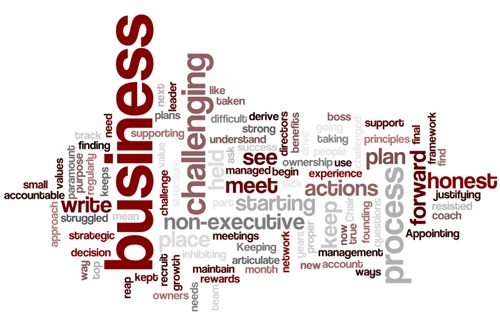All of the themes within the BIG Network have one thing in common – they seek to understand what drives success for the ambitious business owner, in the long-term. At last week’s network meeting we explored the theme of ‘holding yourself to account’ and we felt it important to capture our learning in relation to this theme.
The first point of learning, is that whether informally or formally, successful ambitious business owners seem to find ways to hold themselves to account. But for what and to who?
- ultimately to themselves and for the purpose, values and vision of the business – but also to their customers, staff, suppliers, etc.
- in pursuit of this, having a plan with some longer term goals is a critical part of being held to account – it must be reviewed and changed regularly.
- and, of course, being the best CEO/MD/business owner that they can be, playing to their strengths and adding value to the business now and in the future.
Perhaps the most interesting and surprising learning is how hard this can be for people with an entrepreneurial character. So whether it be a coach, a mentor, a board / non-exec director, a growth club, a business planning and review cycle or their mates down the pub, it appears that they often seek and require some outside help:
- “left to your own devices you will repeat patterns and get stuck”
- “constructive challenge from an outside, objective view can enhance your clarity of vision, strategic direction and ability to lead”
- “coaching can really help you reflect on what is happening and what you want to happen – mentoring can help you access knowledge and experience on how to make it happen”
- “it might seem counter-intuitive for a business owners drive for independence but used well it will actually promote this independence”
But the use of external support comes with some warning,
- “if you have a board you must invest time into the relationships – personality clashes can distract and detract – the relationship between Chair and CEO is a critical one” (click here for more information)
- “finding the right people is hard and potentially harmful – take your time picking the right one – be clear about what you are looking for”
- “you get out what you put in”
Whatever the method it must continually encourage progress – to challenge and to promote learning:
- “recognise and change behavioural patterns that inhibit progress, sometimes all it takes is a dumb question to stop you in your tracks”
- “to avoid complacency, we need fresh perspectives as business grows – we must refresh the process of accountability”
- “regularly review, adapt and agree the terms of reference for the relationship”
- “recognise the informal processes that you all ready have – find ways to use them better”
- “must do it but have a choice of methods – choose one and make it work for you”
In exploring this theme further, the following questions appear important to ask:
- To what extent do people in your business have a clear and common understanding of your purpose, values and vision?
- How often to you review and adapt your plan for growth?
- How do you set goals and appraise performance for your own role?
- To what extent do you model the behaviours you wish to see within your own business?
- How will you independently challenge and verify the above?
The BIG Network provides a space for ambitious owner-managers to explore, challenge and resolve issues that are central to the sustainable success of their organisations. For further information on how to join the network click here

